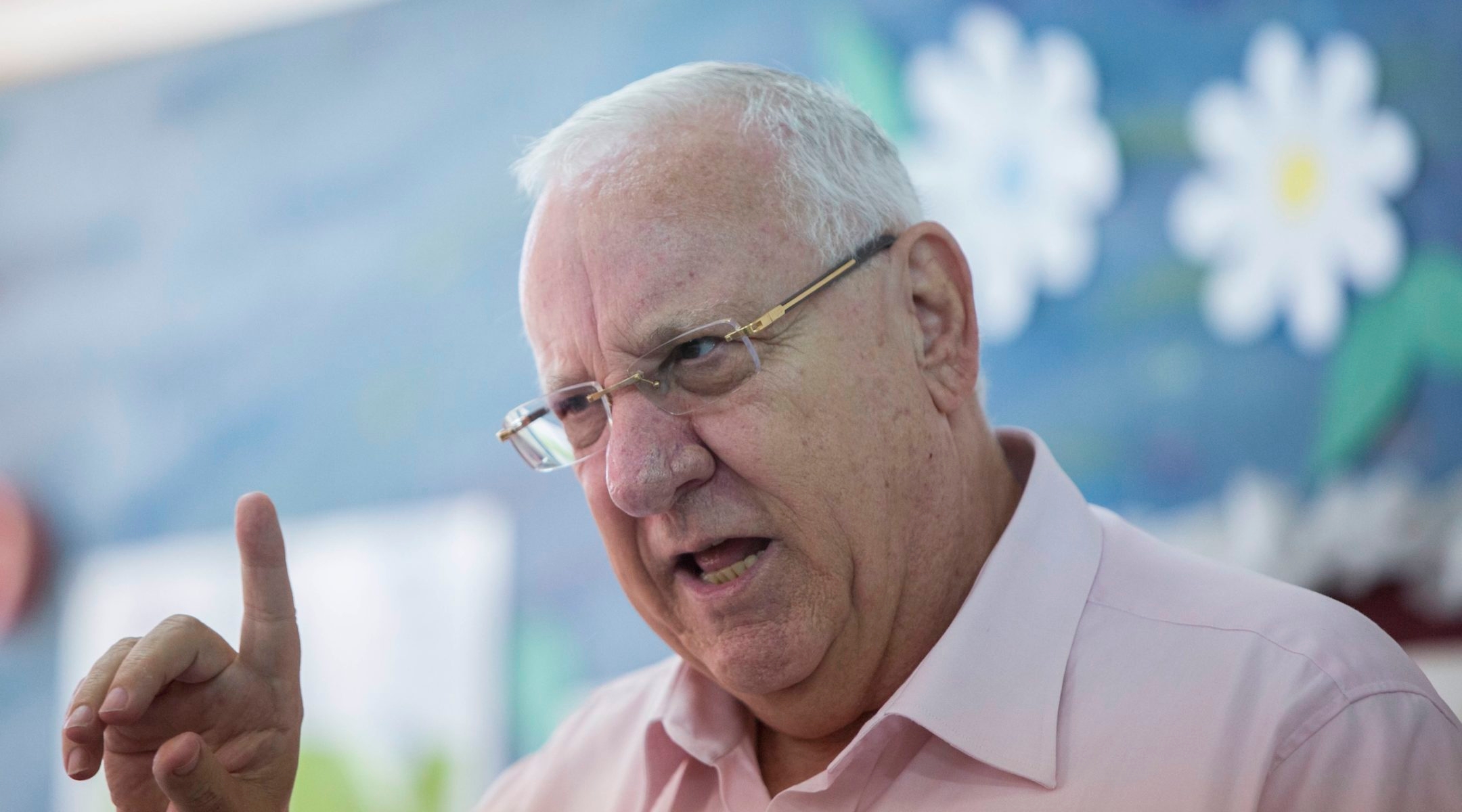TEL AVIV (JTA) — The front-runner in Israel’s presidential election has equated Reform Judaism with “idol worship” and refused to refer to Reform rabbis by their title.
Former Knesset speaker Reuven “Ruby” Rivlin, considered a Likud party elder statesman, is one of six candidates running to succeed Shimon Peres in the largely ceremonial post chosen by the Knesset every seven years. Rivlin is backed in the June 10 vote by Prime Minister Benjamin Netanyahu and much of the center-right governing coalition.
In two stints as speaker of the Knesset, Rivlin was known for his respectful treatment of colleagues of varying political affiliations, though he is not as accepting of diversity within Judaism.
His most scathing remarks about Reform Judaism came in 1989 after visiting Temple Emanu-El, a Reform synagogue in Westfield, N.J.
“I was completely stunned,” Rivlin said in an interview published in Yediot Acharonot. “This is idol worship and not Judaism. Until now I thought Reform was a stream of Judaism, but after visiting two of their synagogues I am convinced that this is a completely new religion without any connection to Judaism.”
Rivlin, who is secular, is not alone among Israeli politicians in seeing Orthodoxy as the sole authentic Jewish practice. Moshe Katsav, who served as president until 2007, also declined to refer to Reform rabbis as rabbis.
But Rivlin’s attitude toward non-Orthodox Judaism is seen by critics as being at odds with his reputation for fairness.
“On a personal level he’s a nice person, kind and caring,” said Uri Regev, a Reform rabbi who led Rivlin’s 1989 trip to Emanu-El and now heads the religious pluralism organization Hiddush. “He may be open-minded on a variety of issues, but his mind was made up on issues of the religious pluralist picture of contemporary Judaism. In that respect he was the same old anti-liberal, closed-minded traditionalist Israeli.”
Rivlin, who declined to speak to JTA, was first elected to the Knesset in 1988 and twice served as the body’s speaker. A self-identified disciple of Revisionist Zionism founder Zeev Jabotinsky, Rivlin opposes territorial concessions to the Palestinians and wants Israel to retain the West Bank. He has said that he supports giving Israeli citizenship to West Bank Palestinians.
Rivlin’s opposition to a two-state solution means that he would be unlikely to reprise the diplomatic role that Peres has played in his tenure as president. A well-known dove, Peres has been uniquely suited to the task of representing Israel to audiences abroad that are skeptical of the country’s right-wing government.
But while Rivlin is hawkish on territorial issues, he is widely regarded as a staunch defender of democratic norms, placing him at odds with others on the right on issues related to civil liberties.
Rivlin’s record earned his presidential candidacy the endorsement of the liberal Israeli daily Haaretz, which cited his “niceness.” Netanyahu’s backing, however, was seen as given more reluctantly. Rivlin, who has had a sometimes acrimonious relationship with Netanyahu, was ousted as Knesset speaker last year in favor of fellow Likud member Yuli Edelstein.
As speaker, Rivlin broke with the Likud-led coalition in 2011 in opposing a law that sought to criminalize the boycott of goods produced in Israeli settlements, explaining in an Op-Ed that the measure “threatens to catapult us into an era in which gagging people becomes accepted legal practice.”
In 2010, Rivlin attempted to block the Knesset from stripping an Arab-Israeli lawmaker of her parliamentary privileges as punishment for participating in the flotilla operation to break Israel’s blockade of the Gaza Strip.
Shmuel Sandler, a political science professor at Bar-Ilan University, said that as Knesset speaker Rivlin treated parliamentarians fairly regardless of party affiliation.
“He created a precedent that you can’t be overly biased,” Sandler said.
But Rivlin has taken a hard line on official Israeli recognition of non-Orthodox streams of Judaism.
In a Knesset session last month, Rivlin said that if Reform or Conservative conversion standards are adopted, determining Jewish status “becomes a civic definition rather than a religious definition.”
“I have no doubt, and my positions are known, that the status of Judaism according to halachah [Jewish law] is what has kept us going for 3,800 years,” Rivlin said in a Knesset speech in 2006. “Besides it there is nothing.”
Rabbi Eric Yoffie, the former president of the Union for Reform Judaism, recalls meeting with Rivlin upon his first run for Israel’s presidency in 2007. Yoffie asked Rivlin whether, as president, he would recognize Yoffie as a rabbi. Rivlin declined to answer.
“He’s a traditional Jew who isn’t sympathetic to Reform,” Yoffie told JTA. “That hasn’t changed. But I do expect candidates for president to act in an appropriate and respectful manner to all elements of the Jewish world.”
Religious pluralism issues have been a point of recurring conflict in Israel-Diaspora relations.
Rabbi Julie Schonfeld, executive vice president of the Conservative movement’s Rabbinical Assembly, said that Rivlin’s past comments about Reform rabbis were “absolutely unacceptable, there’s no question about it.”
However, Schonfeld said she is holding out hope that he will change his views, particularly given that major American Jewish organizations such as the Jewish Federations of North America and American Jewish Committee have made clear their concerns about how the non-Orthodox streams of Judaism are treated in Israel.
“You have to remember what we are looking for is not only word but deed,” Schonfeld said. “There are political figures in Israel who certainly call us rabbi. That doesn’t mean they have done anything to change the law: making state funding of religion available to everyone on an equal basis or having no state funding of religion.”
Rabbi Rick Jacobs, president of the Union for Reform Judaism, declined to be interviewed on the issue. His office referred JTA to an article by Yoffie in Haaretz criticizing Rivlin’s past remarks.
(Julie Wiener contributed reporting from New York.)
JTA has documented Jewish history in real-time for over a century. Keep our journalism strong by joining us in supporting independent, award-winning reporting.






